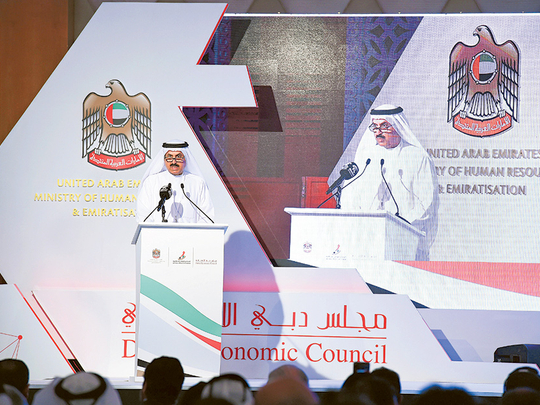
Dubai: New polices and the reallocation of labour may be the key to improving productivity levels in the local economy, speakers at the National Productivity Forum said on Monday. The event, held at the Grand Hyatt Hotel, organised by the Ministry of Human Resources and Emiratisation and the Dubai Economic Council (DEC). Saqr Ghobash, Minister of Human Resources and Emiratisation, inaugurated the forum with a key note speech emphasising the importance of UAE’s move into a post-oil economy.
Professor Catherine Mann, Chief Economist of the Organisation for Economic Cooperation and Development (OECD), said policies should be put into place which promote start-up companies, since they “are the ones with the new ideas, the new business models.”
She said that there is an overall decline in productivity growth, and “policies which encourage start-ups to enter the market, and offer an exit for companies whose resources could be used better elsewhere,” may be the answer to declining productivity.
“We need to think about the reallocation of labour from ‘zombie’ firms to newer ones,” she said, giving Italy as a case study. “Around 35 per cent of Italy’s workers are mismatched for their jobs. Most are over-skilled. If we were to allow zombie firms to go bankrupt and reallocate the workforce, Italy could enjoy a productivity increase of 10 per cent.”
Speaking about the UAE, she said that there was progress in the diversification of its export but still much room to improve. She pointed out that there is a challenge to the UAE’s GDP growth with its declining resources.
Dr Mann also pointed out that “woman participation in the labour market has almost doubled in the last decade,” which she said is something to be proud of.
Dr. Ebrahim Al Badawi, Director of the Economic Policy and Research Center at the DEC, said productivity matters since it is directly related to economic growth, and more high-paying jobs.
Al Badawi said that in the last 14 years, “the UAE has made strides to diversifying its economy” and its veering into a post-oil economy, as per the UAE Vision 2021, was necessary as sustainable growth and diversification is no longer possible under the previous model.
He also said that an integrated, broad-based policy framework was required to boost the economy. He suggested using Hong Kong and Singapore as references for increasing the UAE’s productivity.
Dr. Wifag Adnan, Assistant Professor of Economics at Zayed University, spoke of wage policies in the private an public sectors and the consequences of Emiratisation. She said that 99 per cent of employees in the private sector are expatriates and that wage distribution was at 57 per cent in Dubai and 31 per cent in Abu Dhabi.
“Wage distribution is much higher in the public sector,” she said, adding that affecting factors included education and gender. “Being Emirati seems to affect wage distribution more in Abu Dhabi than in Dubai,” she said.
Dr. Adnan also stressed on new policies being put into place to increase incentive for Emiratis to work in the private sector. More performance pay wage schemes could help, she said, adding that the public sector should be catered to older works (those above 40).











